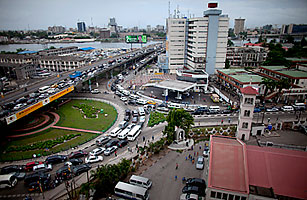
A traffic jam, also known as a go-slow, in Lagos
In his epic 1976 anthem "Go Slow," Afrobeat legend Fela Kuti described the traffic in his hometown of Lagos, casting it as a metaphor for Nigeria's spiritual standstill. "Then your head start to ache because car crush they for your head," he sang. "Lorry they for your front, tipper they for your back, motorcycle they for your left, taxi-moto they for your right."
It's a far cry from this vision of the city put forth by the developers of a new seafront business and residential district for Lagos called Eko Atlantic: "It will be a masterpiece of urban planning ... with its wide boulevards [and] tree-lined avenues with views over the marina and waterway, dynamic waterfront [and] traffic that flows."
If it seems there is a gulf between the two, there is — literally. Eko Atlantic is an artificial island, just offshore, being created entirely from scratch, built of sand dredged from the ocean floor. It will be 7 km wide, extend about 2 km out to sea and house 250,000 residents, with offices for 150,000 commuters. A scale model at the offices of its developers, South Energyx Nigeria, features gin-clear canals, giant malls, three marinas, trams, the island's own power station and a sail-shaped 55-story skyscraper that will be the new headquarters for a Nigerian bank. David Frame, South Energyx Nigeria's managing director, calls Eko Atlantic "the new face of Africa." Onno Ruhl, country head for the World Bank, goes even further, calling it the future Hong Kong of Africa. But plans for Lagos' renovation don't end offshore. Eko Atlantic is the centerpiece of a city redevelopment strategy whose ambition is simple and astonishing: take one of the world's worst cities and make it one of the best. "This is a real attempt to prove Lagos can be an economic powerhouse and a gateway to Africa," declares Frame. Ruhl says, "It's an amazing thing, not least because it actually looks like it will happen."
It would be hard to pick a tougher city to make over than Lagos. The place is more normally known as a living, breathing definition of anarchy. With 10 million to 18 million inhabitants — no one is quite sure — Lagos is the biggest city on the world's poorest continent and one of its fastest-growing, with the population expected to be as large as 25 million by 2015, which would make it the third largest city in the world. Those figures describe an unmatched concentration of poor people. About 65% of Lagosians — up to 11 million people — live below the poverty line, earning $2 or less a day. This is chaos at its ugliest, deadliest and most colossal: a malarial megalopolis mostly built of driftwood, tin and cardboard, with precious little running water, electricity, employment or law and order, where the ground is filled with garbage, the water with sewage and the air with the noise and smog from a million unmuffled exhausts.
How did it get so bad? It is Lagos' peculiar blight that on a continent with space to spare, the city managed to run out of it. When Portuguese explorers arrived in 1472, the settlement of Eko was so scattered around marshes that they eventually renamed it after the Portuguese word for lakes. Then the growth started. First Lagos became a trading hub for slaves, then a British administrative city, then after oil was discovered in the Bight of Benin in the 1950s, a boomtown filled with oil executives and riggers. Finally, as the biggest port in the most populous country in West Africa, it became a megamecca for migrants. Today a new resident arrives every minute, and each finds ever less of Lagos on which to live. Erosion from the pounding Atlantic means the city's coastline has retreated a kilometer since the 1960s.
Such epic overcrowding has spawned a host of other difficulties — not only legendary traffic but also unemployment, poor housing, crime and disease. All that has been exacerbated by Nigeria's notoriously poor government, something that, in turn, has its roots in the country's large oil reserves. Oil, which accounts for about 85% of revenue, detaches a government from its people. Because it does not depend on them for money, it feels little need to serve them. That disconnection helps explain Lagos' decline. When oil prices collapsed in the early 1980s and state revenues tumbled, work on Lagos' infrastructure stopped. But when crude prices recovered, no one thought to resume it.